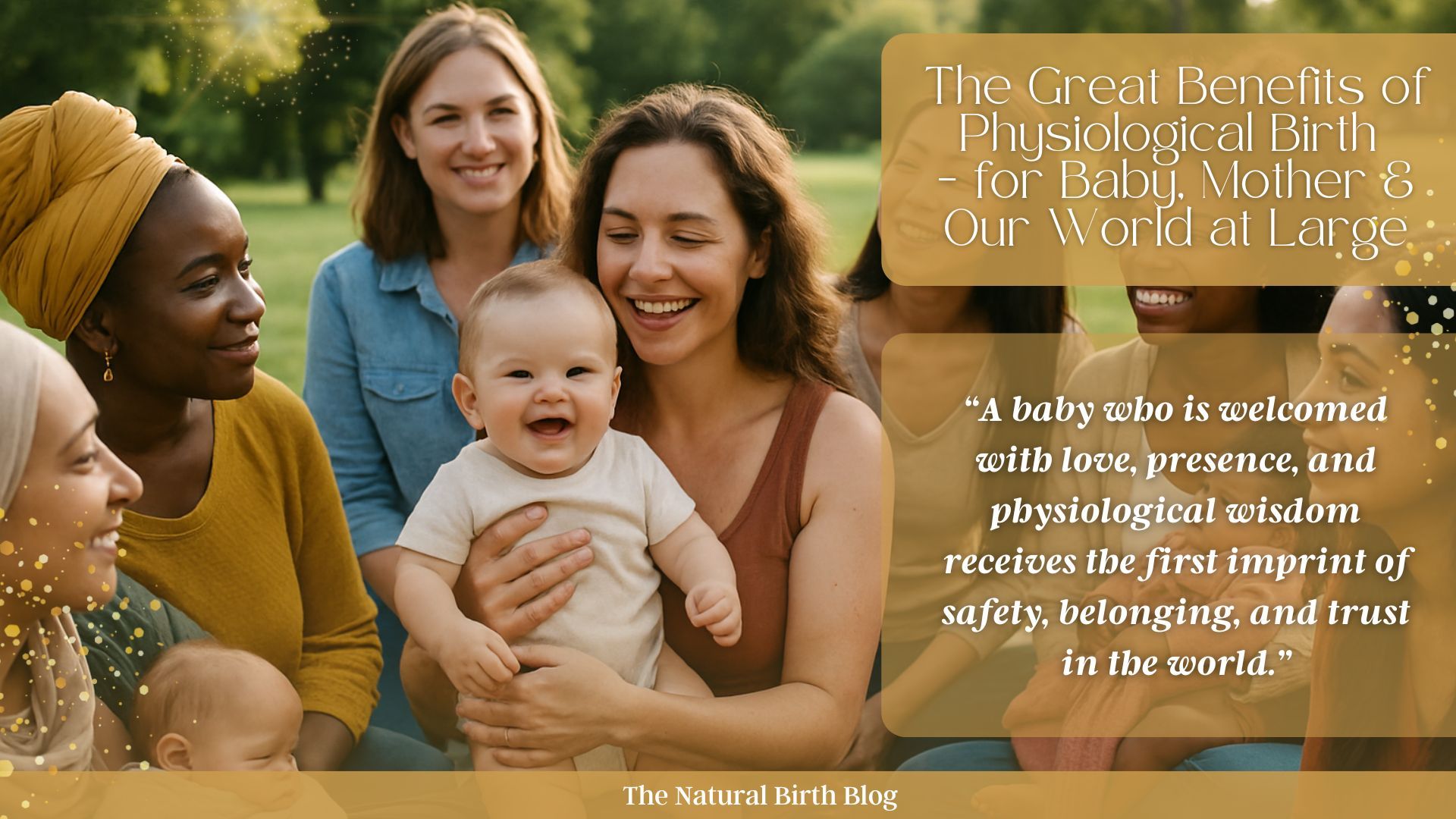The Great Benefits of Physiological Birth — for Baby, Mother & Our World at Large

What if the way we birth has the power to shape not only our families
—but the very fabric of society?
Physiological birth is almost extinct within the western medicalized birth culture (whether you're birthing in a wester country or not) and often minimized in mainstream culture, treated as something idealistic but not for the modern woman.
But in truth, it is the original design, rooted in biology, cellular wisdom, and ancestral memory.
To birth physiologically means to birth in alignment with the body’s natural hormonal orchestration, instincts, rhythms, and undisturbed intelligence.
And the benefits?
They reach far beyond the birth room.
Let’s go deeper into all the ways that physiological birth deeply nourishes the baby, the mother, and our collective human story.
For the Baby: A Wise and Biologically Aligned Entry into Life
Babies are not passive recipients in birth—they are active participants birthing themselves, wired by nature to experience labor as a transformative rite of passage priming them into life on earth.
🌱 Hormonal Priming
In physiological labor, a baby receives an intricate hormonal cascade—particularly catecholamines (stress hormones) and oxytocin (love & bonding hormone) —which amongst many things:
-
Prepares their lungs to transition from being filled with amniotic fluid to breathing air.
-
Supports cardiovascular adaptation to life outside the womb.
-
Facilitates alertness and bonding during the sensitive first hour after birth.
-
Helps regulate temperature, heart rate, and breathing when placed skin-to-skin.
🌱 Microbiome Seeding
A vaginal birth seeds the baby’s gut with beneficial bacteria from the mother’s vagina and rectum. This microbiome:
-
Lays the foundation for lifelong immune function.
-
Supports digestion, brain health, and hormone regulation.
-
Has been linked to reduced rates of allergies, eczema, asthma, obesity, and autoimmune disorders.
🌱 Neurological & Sensory Integration
Being born in a calm, dim, quiet space (which is the birth space a woman following her instincts would birth in, rather than under bright lights, in an unfamiliar place, with strangers surrounded by cold sterile surfaces) without the interference of drugs or any invasive (common) appliances such as a scalp electrode on it's head, allows the baby's nervous system to integrate the sensory overload of birth more smoothly.
Babies born physiologically tend to:
-
Be more alert but calm.
- Transition into earth life with greater ease.
-
Cry less and self-regulate more easily.
-
Latch and breastfeed more effectively.
🌱 Attachment & Bonding
Immediate and uninterrupted skin-to-skin contact and early breastfeeding:
-
Support mother-baby bonding and oxytocin release.
-
Encourage secure attachment, which has long-term implications for emotional resilience and healthy relationships.
- Sets up the breastfeeding journey most optimally
And MOST IMPORTANTLY!
A baby who is welcomed with love, presence, and physiological wisdom receives the first imprint of safety, belonging, and trust in the world.
The long term affects of this on this baby's life and what they'll grow up to contribute to society and humanity at large is unmeasurable but of the out most importance!
For the Mother: A Rite of Passage into showing her Her Incredible Power & Divinity
Physiological birth is not just a process—it is an initiation.
It invites a woman to go deep within herself, let the maiden die and to rise through the intensity as a new born mother, and to emerge on the other side changed forever.
If left alone without interference but loving support and a steady presence, a woman will navigate the intensity, fear and hugeness of birthing new life and discover her Power and Divinity through it.
🔥 Neurohormonal Transformation
During labor, a complex interplay of oxytocin, beta-endorphins, prolactin, and catecholamines floods the maternal brain.
These hormones beyond facilitating labour contractions and the birth of the baby:
-
Reduce pain perception.
-
Induce trance-like, altered states of consciousness.
-
Deepen emotional bonding.
-
Create the "maternal instinct" wiring that activates after birth.
This hormonal cocktail is nature’s design for an empowered, embodied, and bonded mother.
🔥 Psychological Empowerment
A mother who experiences physiological birth often:
-
Feels more confident and capable in her body.
-
Experiences birth as a personal triumph and/or spiritual awakening.
-
Is more likely to report satisfaction with her birth experience—regardless of outcomes—when she feels respected, informed, and autonomous.
This can lead to stronger mental health postpartum, with lower risks of postpartum depression and anxiety.
🔥 Physical Recovery
Physiological birth typically results in:
-
Faster and better postpartum healing.
-
Fewer perineal injuries.
-
Less blood loss.
-
Higher chances of exclusive breastfeeding.
Women are often up, walking, and connecting with their baby within hours—rather than days—after birth.
🔥 Reclaiming Sovereignty
To birth physiologically in a medicalized culture is revolutionary. It:
-
Reconnects women to their intuition and wild wisdom.
-
Breaks cycles of trauma, fear, and control.
-
Teaches her to trust her body and make informed decisions—not just in birth, but in motherhood and life.
Creates Dangerous Women who are not easy to Control

For Our World: How We Birth & Are Birthed into this World Matters
Birth is not separate from society—it mirrors it.
How we birth shapes our values, our health systems, our attachment styles, our generational patterns.
So when we change birth, we change the world.
For Better or Worse.
🌍 Healthier Families, Healthier Communities
- Women having a Physiological Birth report higher birth experience satisfaction & lower rates of mental health issues. They come away feeling Strong & Capable. And the world needs more women feeling Strong & Capable.
-
Physiological birth supports breastfeeding, which improves health outcomes for both baby and mother long-term.
-
Strong attachment and maternal confidence foster more secure, emotionally resilient children.
-
Breastfed, well-attached babies grow into more emotionally regulated and socially secure adults.
🌍 Economic & Environmental Impact
-
Fewer interventions mean lower healthcare costs, reduced antibiotic use, and fewer hospital-acquired complications.
-
More home and birth center births (where 99% of physiological births occur) reduce costs, medical waste, energy usage, and unnecessary surgical births.
-
Breastfeeding reduces reliance on formula (a multi-billion-dollar industry tied to deforestation, energy use, and waste).
🌍 Reclamation of Feminine Wisdom
Every physiological birth challenges the narrative that birth is dangerous, that women are broken, and that technology knows better than nature.
It reclaims birth as:
-
A spiritual portal.
-
A cultural rite.
-
A return to feminine leadership and instinct.
When birth is honored, women rise.
And when women rise, everyone benefits.
Let’s Be Clear
To strive for a Physiological Birth for the wellbeing of our babies, mother s and our world is not about physiological birth above all.
It’s not about judgment or shame if medical help is needed.
It’s about knowing that your body was made for this, and most women and babies can achieve it.
That birth, when supported and undisturbed, is not a crisis—it is power.
And that reclaiming physiological birth is not just a personal healing—it’s a collective revolution.
🌿 Want to Experience Birth this Way?
✨ Prepare your body, mind, and soul for a physiological birth with The Natural Birth Course.
✨ Connect with like-hearted women inside The Village.
✨ Listen to real stories of sovereign, natural, physiological births on The Natural Birth Podcast
Because the way we birth… matters!











